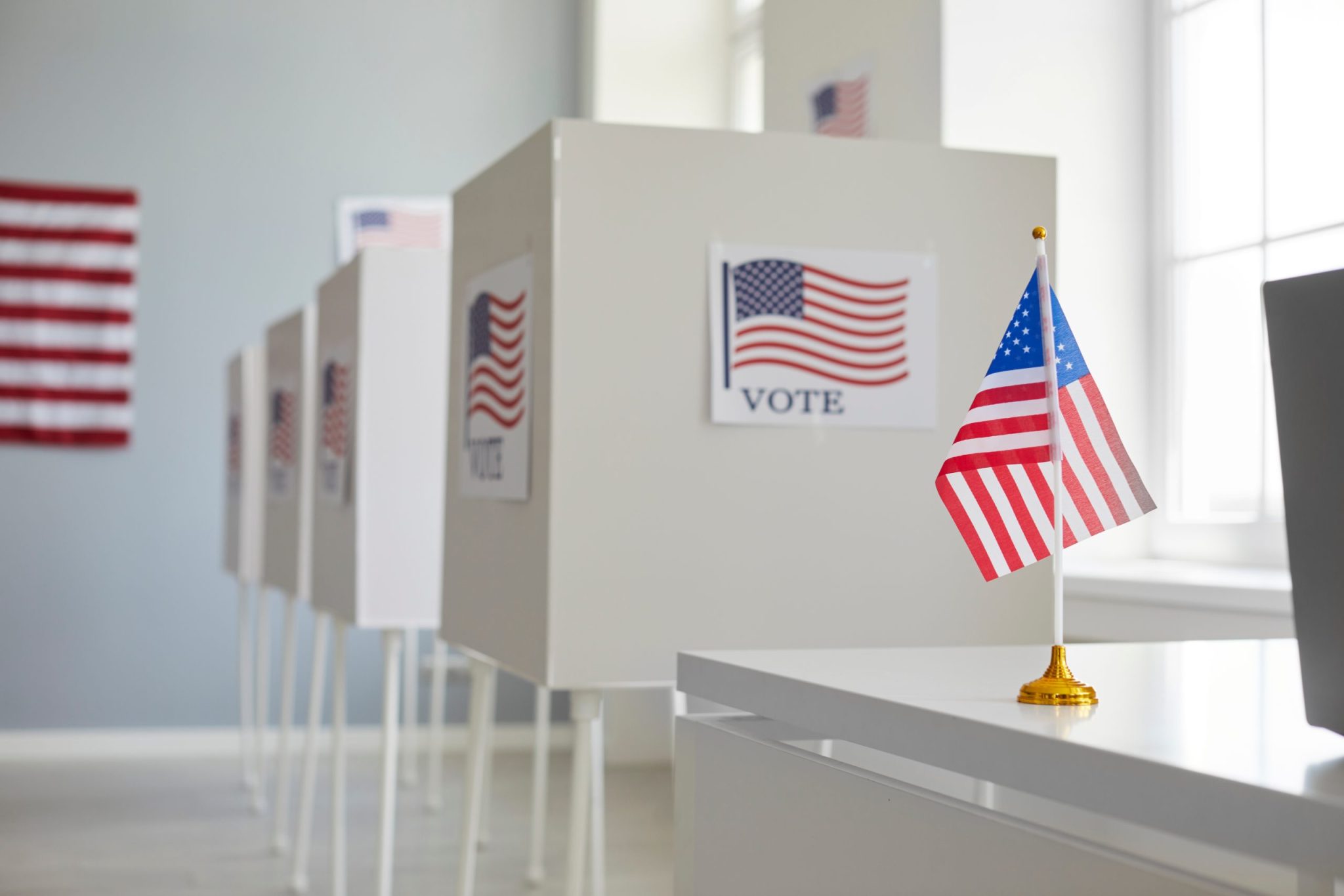This is the first in a series of reports covering online conversations related to the security and administration of the 2024 US elections. These reports are meant to highlight key narrative trends in the election space, including but not limited to online conversations about election integrity and voter fraud. Each report will provide an overview of online conversations about the administration of US elections, along with in-depth analyses of relevant topics and themes.
In this report, we cover the surge in voter fraud conversation in the United States after the contested election in Venezuela—noting that evidence of potential election rigging in Venezuela revived narratives about voter fraud in past and future US elections. We found that:
- There was an estimated 73% increase in posts about election fraud on monitored platforms in the 30 days after the Venezuelan election compared to the 30 days prior. While this spike was anticipated given doubts about the outcome of the Venezuelan election, in sampled English-language posts containing the words “election” and either “fraud”, “stolen”, or “rigged” between July 28 and August 27, 2024, nine of the 10 most mentioned entities were Americans, suggesting that conversations around election integrity—even those that referenced Venezuela—were still very much focused on the United States.
- US voting machine vendor Smartmatic was again at the center of election rigging narratives, with allegations that the vendor was used in both the 2020 US presidential election and the 2024 Venezuelan election—allegations that were bolstered by criminal charges filed in August against Smartmatic executives for bribing a Filipino election official. Smartmatic equipment, however, has not been used in Venezuelan elections since 2017, and its machines were used in only one US county in 2020.
- Images, memes, and charts used to cast doubt on the integrity of the 2020 US presidential election were resurfaced to draw supposed parallels between alleged fraud in the United States and credible claims of irregularities in Venezuela. In many instances, these images were used to suggest that elections in the United States are at least as, if not more, corrupt than those in Venezuela.
- Arizona remains the epicenter for conversations about voter fraud. In our sample of posts referencing terms related to voter fraud, it was estimated that users in Arizona—based on self-reported location data—made more posts per capita about election fraud than users in any other US state.
About ASD’s Data Collection
Data for these reports is primarily sourced from Infegy Atlas, a social media analytics platform that collects a sample of public posts from X, Instagram, Reddit, TikTok, and selected blogs. In this report, we cite approximate numbers that represent the “social universe” for posts related to specific queries. To calculate the “social universe”, Infegy Atlas takes the number of posts returned for each specific query, applies a scaler, and normalizes it based on post-volume data from November 2023. These statistics should therefore be viewed as approximations and not exact totals.
We also include data from a list curated by ASD of verified social media accounts connected to the presidential candidates as well as candidates in House, Senate, and gubernatorial races in the United States on X, Facebook, Instagram, YouTube, TikTok, Rumble, Telegram, and Truth Social. Candidates are only added after they win their respective party’s nomination, meaning that data from certain candidates may not be included in a report if their state’s primary elections were held near to or after the date of the report. Statistics related to candidate accounts are more precise given that we collect data on every post made by relevant accounts; however, it is possible that certain candidate accounts were not identified or could not be verified, meaning that some relevant posts may not be included in our data.
Online Conversations about Voter Fraud Surged After the Venezuelan Election
In late July, incumbent Venezuelan President Nicolás Maduro claimed victory in an election that “did not meet international standards of electoral integrity and cannot be considered democratic”, according to independent observers from the Carter Center. The disputed election has sparked protests in Venezuela that continue to roil the country and region, but the ripple effects also have been felt in the United States, where legitimate doubts about the results of Venezuela’s election have been framed by some as evidence that all elections, including past and future US elections, were or could be rigged.
Using Infegy Atlas, we queried posts that contained the word “election” along with either the terms “fraud”, “stolen”, or “rigged” between July 28 and August 27, 2024. This query generated an estimated 2.23 million relevant posts, a roughly 73% increase from the previous 30-day period. Unsurprisingly, the highest number of posts containing our queried fraud-related terms occurred on July 29, the day after the Venezuelan election.
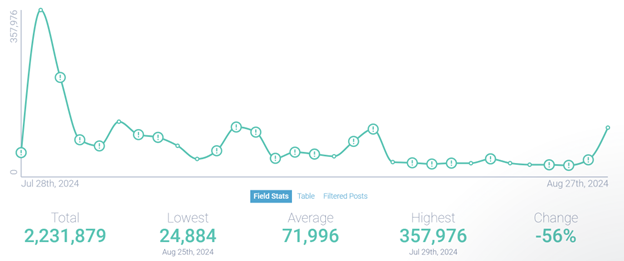
Figure 1: Number of posts collected by Infegy Atlas with the terms “election” and either “fraud”, “stolen”, or “rigged” between July 28-August 27, 2024
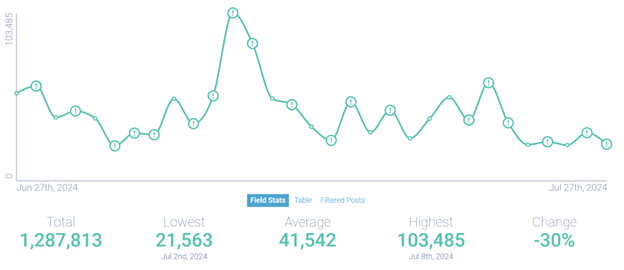
Figure 2: Number of posts collected by Infegy Atlas with the terms “election” and either “fraud”, “stolen”, or “rigged” between June 27-July 27, 2024
As detailed later in this report, allegations of fraud in Venezuela’s election were used as a springboard for claims about fraud in US elections. Indeed, of the 10 most mentioned entities in posts about election fraud during the studied period, nine were US citizens—though some of those individuals, particularly Elon Musk, were active in conversations about the Venezuelan election. Venezuelan President Nicolás Maduro was only the ninth most mentioned entity, though we only queried terms in English. Using similar terms in Spanish, Maduro was easily the most mentioned entity during the studied period.
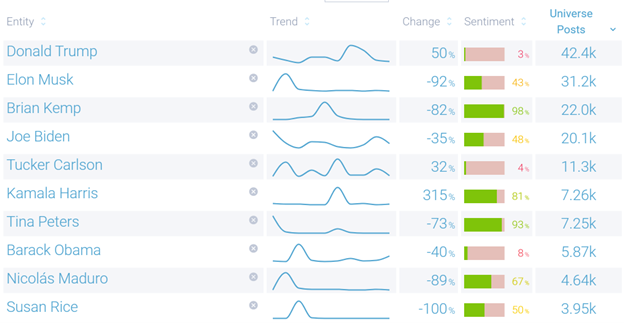
Figure 3: The 10 most mentioned entities in posts collected by Infegy Atlas with the terms “election” and either “fraud”, “stolen”, or “rigged”. Universe posts are estimates of the total number of posts generated by a query that referenced the named entities.
Candidate Discussions of Electoral Fraud
Among tracked candidate accounts, we found 111 posts between July 28 and August 27 that mentioned “election” and either “fraud”, “stolen”, or “rigged”. A manual review of those posts found that 17 were not relevant (for example, posts calling their opponents “a fraud” or promising to combat government fraud), leaving a total of 94 relevant posts from candidates. That represented a roughly 50% increase in posts about electoral fraud compared to the 30 days prior. Again, the contested election in Venezuela served as a catalyst for fraud-related conversations, though only 26 of the 94 relevant posts mentioned Venezuela directly and several of those posts used the Venezuelan election to pivot to conversations about election integrity in the United States.
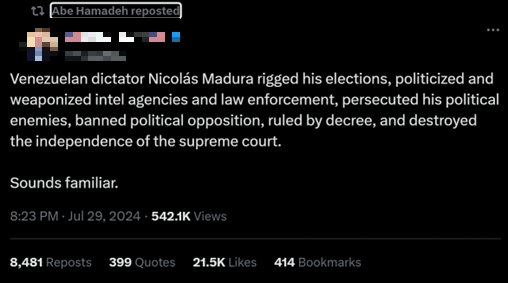
Republican candidates were roughly twice as likely as their Democratic counterparts (63 posts compared to 31 posts) to post about election fraud. One of the most common themes from GOP candidates was that Republican voters need to turn out in large numbers to make the election “too big to rig”, a phrase prominently used by former President Donald Trump.
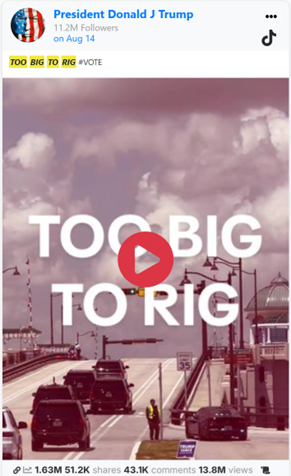
There were also several posts alleging that legacy media or Big Tech are rigging the election by censoring conservatives or providing disproportionately unfavorably coverage of Trump—a theme that has been prominent in past elections.
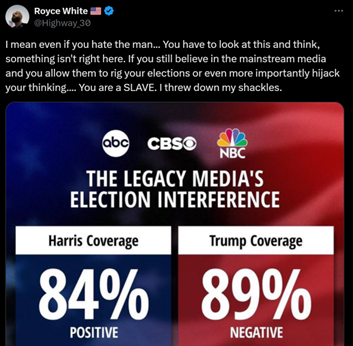
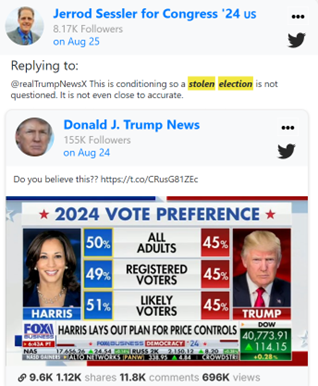
Democrats, on the other hand, typically mentioned voter fraud in the context of criticizing their opponents, former President Trump, or the GOP more broadly of being election deniers or for pushing the “Big Lie”. A few posts also referenced the Venezuelan election, though the framing was flipped from similar posts made by GOP candidates that attempted to draw parallels between Venezuela and the United States.
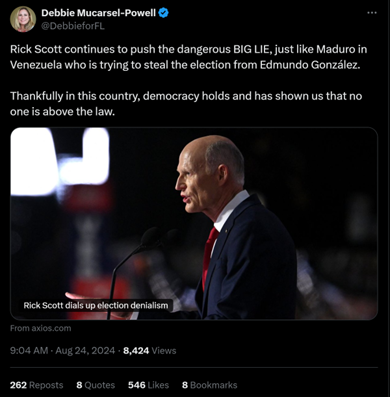
Contested Election in Venezuela Fuels Election Skepticism in the United States
The narrative that Venezuela’s election was in some way linked to supposed election rigging in the United States appeared almost immediately after doubts were raised about the legitimacy of the vote count in Venezuela. According to an analysis conducted using Infegy Atlas, in the month after the election there were an estimated 60,000 posts mentioning “Venezuela”, “election”, and “2020” across monitored platforms. While not all posts containing those three terms were relevant (there were several posts comparing the Venezuelan election to the contested presidential election in Belarus in 2020), the most common named entity in those posts was US President Joe Biden and the most common topic was “Democrats stealing [the election]”. These posts, many of which came from accounts with a history of casting doubt on US elections, used allegations of fraud in Venezuela to resurface claims that the 2020 US election was similarly rigged.
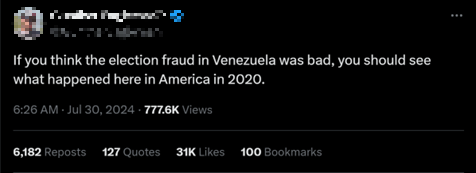
One viral tweet that has been viewed more than 1.5 million times showed a widely circulated image of a US election worker covering windows at a counting center in Detroit in November 2020 with the caption: “Picture of the election being stolen in Venezuela last night. Oh wait – that’s Democrats stealing the 2020 U.S. election. Sorry, wrong pic”.

Another popular meme showed two so-called “fraud curves” or “F curves”—a term popularized after the 2020 US election to describe an allegedly inexplicable spike in vote totals for one candidate—purporting to depict the vote counts in Venezuela in 2024 and the United States in 2020. The insinuation was that both Biden and Maduro received a suspicious, if not statistically implausible, late influx of votes to surpass their opponents. As noted in X’s community notes, the chart claiming to represent Venezuelan election data is entirely fabricated. “F curve” posts also largely failed to acknowledge that the “spike” in vote totals in certain US states in 2020 was the result of the release of absentee or in-person vote counts en masse, a level of real-time tabulation transparency that does not exist in Venezuela.
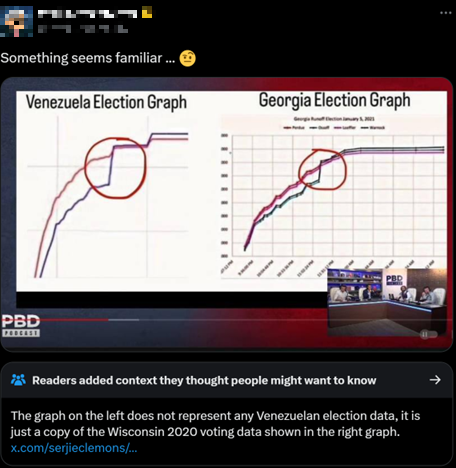
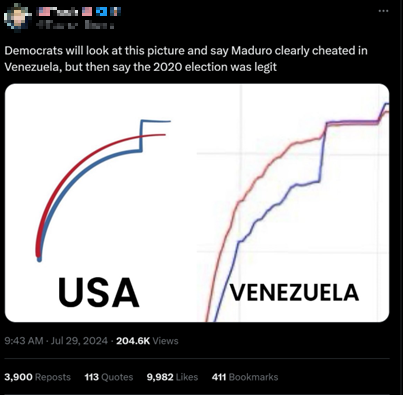
Another theme that emerged was that the Biden administration and left-wing media’s response to irregularities in Venezuela was either hypocritical or a preview of Democrats’ malfeasance in the 2024 election.
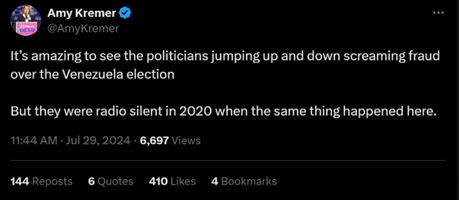
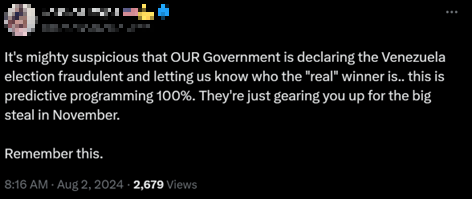
Posts about Venezuela that foreshadowed post-election turmoil in the United States were not limited to the political right. Rather than suggesting ballot rigging or fraud, left-leaning accounts focused on Maduro’s refusal to accept the outcome of the election, arguing that Republicans and former President Trump would do the same in November.
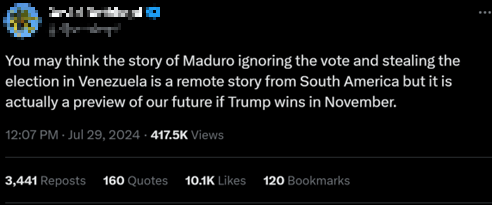
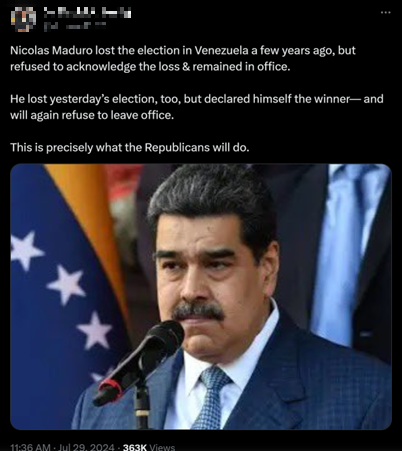
The Smartmatic Connection
Beyond general claims of fraud, those seeking to draw parallels between the 2024 Venezuelan election and the 2020 and 2024 US presidential elections honed in on a seemingly significant coincidence: the alleged use of Smartmatic voting machines in Venezuelan and US elections. In the three weeks after the July 29 Venezuelan election, there were an estimated 15,000 posts that mentioned “Venezuela” and “Smartmatic”. Smartmatic—the voting machine vendor that is suing Fox News, Newsmax, Rudy Giuliani, and others over false claims about its role in rigging the 2020 election—was also the most commonly named entity in posts with the terms “Venezuela”, “election”, and “2020”, appearing more often than Maduro or Trump.
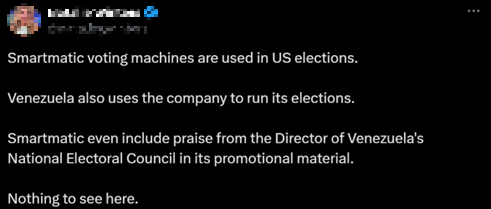
Claims of an illicit connection between Smartmatic and Venezuela are not new. After the 2020 US elections, Giuliani and Sidney Powell, who was then part of President Trump’s legal team, promoted the theory that Smartmatic software was created to help rig elections for former Venezuelan leader Hugo Chávez. While it is true that Smartmatic was founded by two Venezuelans in Florida and was used in elections in Venezuela starting in 2004, the company accused the Venezuelan government of fraud in 2017 and has not been used in any Venezuelan election since. Moreover, Smartmatic voting machines were only used in Los Angeles County in 2020 and not in any swing states that could have affected the final results.
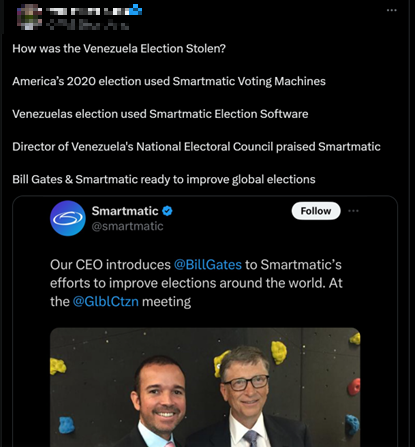
Despite rather obvious inaccuracies in allegations that Smartmatic could have played a role in either the 2024 Venezuelan election or past or future US elections, those making these claims were buoyed by criminal charges filed in early August against two Smartmatic executives for allegedly bribing an election official in the Philippines. Unsurprisingly, this fueled a second round of allegations against Smartmatic, using the factual allegations of bribery to cast doubt on the company’s role in both Venezuela and the United States.
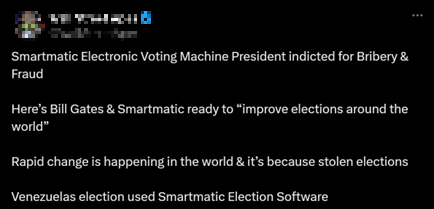
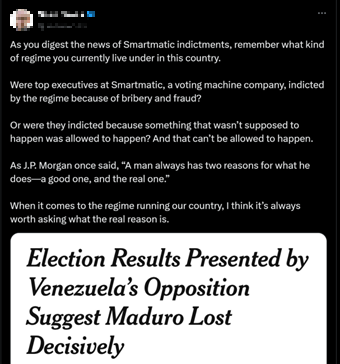
We found evidence of six candidates—all Republicans—who commented on the Smartmatic bribery charges, though none of those candidates mentioned the Venezuelan connection.
Arizona Remains the Epicenter of Election Fraud Conversations
Accounts in Arizona made more posts per capita about election fraud narratives than accounts in any other US state, based on self-reported location data. In a sample of roughly 43,000 posts mentioning “fraud”, “rigged”, or “stolen” elections collected by Infegy Atlas between July 28 and August 27, 2024, Arizona had the highest “score”, a metric that weighs the number of estimated relevant posts by users within a state with the state’s total population. Arizona was followed by Nevada, Texas, Florida, and Tennessee. The state with the lowest score—meaning users within the state produced the smallest number of relevant posts per capita in the sample—was Vermont.
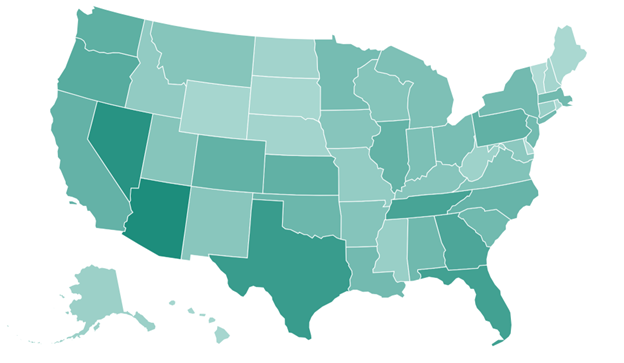
Although Arizona held a primary election during the studied period, the top election fraud-related topics posted by users in Arizona focused on issues outside the state—notably the decision of the Georgia State Election Board to give local election officials the ability to delay certification of the vote and the conviction of Tina Peters, a former county clerk in Colorado, for allowing unauthorized access to voting equipment. There were, however, more than 400 posts in our sample celebrating the GOP primary defeat of Stephen Richer, the Republican Maricopa County Recorder whose public defense of Arizona’s elections has made him a target of election deniers. This was framed as a win for “election integrity”. Richer’s loss was also the target of critical posts from Arizona GOP candidates Abe Hamadeh and Kari Lake and Florida GOP representative Anna Paulina Luna, all of whom have cast doubt on the integrity of US elections.
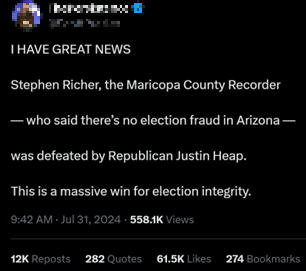
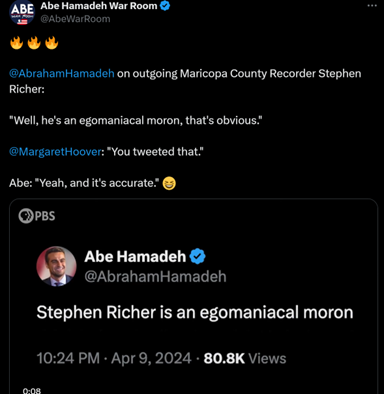
Policy on Identifying the Authors of Posts
We believe that it is important to provide examples of relevant posts in our reporting. We also believe that it is at times irresponsible to identify the authors of those posts, both to avoid potential harassment of those individuals and, in some cases, to avoid amplifying accounts promoting false or misleading claims. The purpose of these reports is to provide a better understanding of narrative trends related to the administration and security of the 2024 elections—not to highlight, positively or negatively, any individuals or groups.
We therefore have decided to not provide hyperlinks to referenced posts, opting instead for screenshots. By default, we will blur the username, icons, and any biographical information. The exception to this rule is if the post is made by a candidate for office or another public figure or if knowledge of the identity of the author is needed to provide context. We understand that there are drawbacks to this approach, but it is meant to balance the need for transparency in our reporting with our desire to avoid singling out individual authors.
The views expressed in GMF publications and commentary are the views of the author alone.

